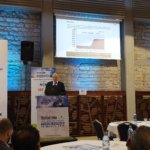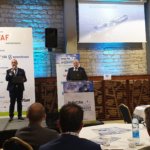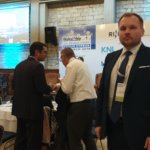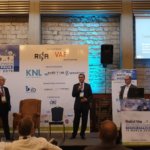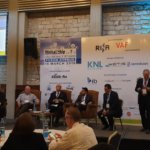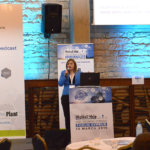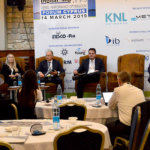Digital Ship Vessel Performance Optimisation Forum Cyprus
26.03.2019

14.03.2019 Digital Ship Vessel Performance Optimisation Forum Cyprus at Carob Mill Limassol
The conference was opened by its Chairman – Mr. Adonis Violaris, Marketing Director at Interorient Shipmanagement. After few welcoming words addressed to the audience the floor was given to Mr. Costas Iacovou, a Permanent Secretary of the Shipping Deputy Ministry to the President. He tried to present Cyprus as a Maritime Destination.
Merchant shipping has developed rapidly over the last decades in Cyprus ranking the country amongst the main maritime powers of the world with:
1. the 11th largest fleet globally,
2. the 3rd largest fleet in Europe.
Cyprus is a modern, efficient and integrated shipping cluster ranked amongst the leading in the world. As a third-party ship management centre it is the largest in Europe and amongst the top 3 worldwide. More than 20% of the worlds’ third party management fleet is managed by companies based in Cyprus.
Limassol, the heart of the Cyprus maritime cluster, hosts more than 200 companies offering shipping and shipping-related services from ship ownership and ship management to shipping insurance, shipping finance, brokerage, bunkering, ballast water system production, marine training, maritime technology in satellite and radio systems and many more.
He stated that Cyprus flag is a top-quality sovereign flag which duly adheres to all safety and security standards deriving from the Paris and Tokyo MoUs and is in the “White List” of both MoUs. More than 150 dedicated maritime specialists at the Shipping Deputy Ministry offer tailored, 24/7 service from our offices in 7 different countries. Cyprus is amongst the countries having a prominent role in forming global shipping policies with a strong presence and a powerful voice in all maritime fora and international organizations such as the IMO, the ILO and the European Union. Cyprus as one of the leading Maritime cluster will always be on shipowners side.
Afterthat the voice was gave to Mr. Eugen Adami, Managing Director at Mastermind Shipmanagement Ltd. He told that we need to think about the consequences of digitalisation when we do not get it right with data storage and transfer are:
1. new big data needs new storage,
2. massive data centers are currently built,
3. data centres need huge amounts of electricity,
4. the data processing for 1,5 mln autonomous cars would be use all the electricity of the German North Sea and Baltic wind parks alone.
Taking the above into consideration, in his opinion, the conslussion is that in order to reduce Global Warming we need to limit Digitalisation starting now to avoid biulding new powerplants with fossil fuel. Digitalisation, Big Data, what is that accually? Before we talk about digitalisation we need to define the need and to consider data production, re-usability and managing huge data packages both onboard and ashore. Taking advatnage of big data requires real deep thinking i.e. how data is built and used, how much of it we can handle, is the data reliable, how fast we can proces and analyze it. Current usage of the term big data tends to refer to the use of predictive analytics, user behavior analytics, or certain other advanced data analytics methods that extract value from data, and seldom to a particular size of data set. Digitalization is the process of converting information into a digital (i.e. computer-readable) format, in which the information is organized into bits.
Then he talked few words about smart port that is developing system to which all masters upload cargo, ship’s and crew declarations just one time. He pointed that the system should:
- accept reasonable ETA as if the master would tender the Notice of rediness already (while he is still in the previous port),
- give the master the berthing window,
- inform the vessel the avalivable berthing time, allowing the master to adjust his speed accordingly without changing the initial ETA meaning,
- help to reduce emission from vessels and reduce the greenhouse gases (ships perform voyage with minimum speed and consumption.
The next step is the Smart Ship that will correct the speed according to the allocated berthing window and informs all party stakeholders about the voyage progres. The system will consolidates all info in the ECDIS (passage plan module, trim and engine control data). The master shall be notified when real measured data deviates from his voyage estimate.
The last stage of digitalisation of Shipping insdustry is the modern shipbiulding that should focus on efficiency of the vessel as well as how to maintain the vessel with minimum crew. All documents needs to be digitalised. All operational manuals and all spare parts need to be avalivable in a common source database at the design office. Yards will benefit from such data as they can produce better and more detailed designs with more efficiency and less pipework and cables. Commisioning engineers can see on smart device how to commission complex equipment with may different interfaces form multiple manufactures.
Next speech was delivered by Mr. Oleg Kalinin, Fleet Director at SCF Shipmanagement. The topic – LNG fuel as an alternative to low-Suplhur marine gas oil for complying with the new emission rules. After company’s introduction he stated that IMO sets 1 January 2020 for ships to comply with sulphur with a sulphur content of more than 0,50% //m, against the current limit of 3,50% m/m.
To comply with the above the shipowners/shipmanagaers have three choices of fuel:
1. use IMO 2020 – compliant fuel with 0,5% maximum sluphur content,
2. continue to use high sulphur fuels (HSFO_ if a vessel is equipped with a scrubber, we have significant increase of ordered scrubbers -2018 – 828 vessels; 2019 – 2467 vessels; 2020 – 2702 vessels; 2021 – 2756 vessels.
3. use an altarnative marine fuels such as liquifield natural gas.
The numer of ships using LNG as fuel is increasing and more and more infrastructure projects are planned or proposed along the main shipping lanes. In 2019 we had 79 LNG ready vessels, in 2019- 112, in 2020- it will be ca 139. Ships on order – 2019/63, 2020/94, 2021/123, 2022/130.
While only approximately 2500 ships are expected to have scrubbers in early 2020, this will correspond to approximately 10-15% of the marine fuel consumption, requiring the rest of the fleet to rely on compliant fuel.
Then he talked about disadvantages associated with LNG:
1. difficulties in retrofitting ships,
2. uncertainties around future avalivability and pricing of the fuel,
3. availability of lng bunkering infrastructure. While available in Northern europe, there is a relatively scarcity in many parts of the world, making it impractical for ships sailing on many deep sea routes,
4. the cost of equipping a vessel with LNG capable engines has decreased in recent years, although many Owners are still opting to biuld their ships to an LNG-ready specification, allowing the vessel to be retrofitted to use LNG fuel at a later date.
The speakers tried to shape the future of shipping. Everyone used the common word – digitalisation. And here comes the most important question – who is responsible for domage caused by ship „controlled” from the land? If there is no crew on board and its speed, direction are provided by satellite communication system? If there is a „system error”? The operator that is located ashore, owner or ship manager? All speakers agreed that this should be regulated by international law.
The last speeker, Mrs. Gina Panayiotou, Global Head of Shipping and Energy at Michael Kyprianou & Co. LLC. told about a New Era and the legal challenge. Shie tried to answer on the following questions:
1. IMO 2020: what will be the impact of trade?
As from 1 January 2020 ships must run on fuel containing no more than 0,5% m/m of Suplhur. The only exception provided for conitunuing to run on non-compliant fuel is scrubbers installation. Opting non-compliance – fines, detention of the vessel, ship owner pays costs – will have to prove what compliance measures were implemented; whether cost is recoverable from a charter depends on charter party, and and cause of non-compliance.
For that reason chartets entered into prior to 1 January 2020 but which will extend betond that date will need to contain specific terms to deal with the new regime. Her advice was that if uncertainty exists then it is advisable to agree certain addenda with charterers to avoid any potential disputes in the future.
2. autonomous vessels: what are the risks?
To sum up, the digitalization, brings the need to reform many fields related to the shipping industry. It is also a great challenge to not worse the current situation by introducing digitization in bad way. It is necessary to popularize alternative energy sources. For the shipping industry this will contribute to a significant reduction of greenhouse gas emissions.
On the other hand, one we should realize is, that due to the growing world population, we are not able to rely on solar and hydro energy. It is therefore necessary to ensure that the current energy sources (coal, fossil fuel etc) are more environmentally friendly. All you need is to develop the right technology.

